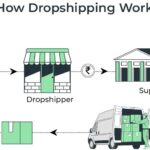Understanding Affiliate Marketing: A Complete Guide
Affiliate marketing is a cornerstone of modern digital commerce, providing a mutually advantageous agreement for merchants and marketers. At its core, it is a performance-based marketing technique in which merchants compensate affiliates for driving traffic or sales to their company via the affiliate’s marketing efforts. The process normally comprises four main players: the merchant (also known as the advertiser or retailer), the affiliate (the marketer or publisher), the consumer, and the affiliate network (which supports the merchant and affiliate interaction). This approach offers affiliates a low-risk way to generate passive money by marketing businesses or services they believe in. They receive a reward for each successful referral, pushing them to generate high-quality traffic and conversions. Affiliate marketing provides retailers with a low-cost alternative to grow their reach and generate sales without making a large upfront advertising commitment. Furthermore, it enables merchants to tap into affiliates’ expertise and audience, utilizing their marketing channels and influence to produce targeted traffic and income. Overall, affiliate marketing is built on collaboration, trust, and mutual benefit, making it a dynamic and adaptable strategy for businesses of all sizes in the digital age.
[adinserter block=”1″]
Starting Affiliate Marketing: Step-by-Step Instructions
Beginning the adventure of affiliate marketing necessitates strategic planning and a clear path to success. To begin, potential affiliate marketers should determine their specialization or area of expertise. Selecting a niche that corresponds to personal interests, knowledge, and audience preferences creates the groundwork for successful marketing activities. Once the niche has been determined, it is critical to study and select reliable affiliate programs relating to the chosen specialty. Platforms such as Amazon Associates, ClickBank, and ShareASale provide a vast range of items and services across multiple industries, catering to a diverse audience. After picking appropriate affiliate programs, having a platform to market products becomes critical. This could be a blog, a website, social media channels, or a combination of the above. Quality content development is essential for attracting and engaging audiences, whether through educational blog entries, fascinating videos, or engaging social media content. Building an audience and establishing trust requires patience, consistency, and sincerity. Finally, collecting and analyzing performance indicators using tools such as Google Analytics or affiliate network dashboards allows affiliate marketers to optimize their strategy, uncover successful approaches, and fine-tune their approach to maximize efficacy. Individuals who follow these step-by-step recommendations and remain committed to the process can establish the groundwork for a successful affiliate marketing company.
Choosing the Right Affiliate Program: Tips & Strategies
Choosing the correct affiliate programs is an important step in ensuring the success of your affiliate marketing venture. To begin, conduct extensive research and evaluate the legitimacy and reputation of various affiliate programs. Look for programs that are relevant to your specialty and offer items or services that will appeal to your target audience. Consider commission rates, payment terms, and cookie duration to maximize your earning potential. Opt for programs that offer competitive commissions and fair reward for your efforts, as well as an appropriate cookie duration to guarantee you earn credit for referrals even if they do not make a purchase immediately. Furthermore, emphasize initiatives with dependable tracking and reporting tools, which will allow you to analyze your performance and adjust your plans accordingly. Before committing to a collaboration, don’t be afraid to ask program managers or other affiliates for thoughts and opinions. Finally, diversify your portfolio by joining multiple affiliate programs in your industry to reduce risk and profit on multiple revenue streams. By following these ideas and methods, you will be able to make informed judgments and choose the best affiliate programs to propel your success in the competitive world of affiliate marketing.
[adinserter block=”1″]
Creating a Successful Affiliate Marketing Strategy
A successful affiliate marketing strategy demands careful planning, smart execution, and ongoing optimization. Begin by setting specific goals and objectives for your affiliate marketing initiatives, such as increasing website traffic, driving sales, or raising brand awareness. Next, undertake in-depth research to determine your target audience’s needs, preferences, and pain areas. Understanding your target demographic enables you to adjust your marketing messaging and promotional efforts successfully. Once you have a thorough grasp of your target audience, create a content strategy that focuses on providing value and solving their concerns. Whether it’s through blog posts, videos, social media material, or email newsletters, continuously deliver high-quality, relevant content that connects with your audience while effortlessly promoting affiliate products. Furthermore, focus on developing trust and credibility with your audience by only endorsing products or services that you actually believe in and have personally tested. Transparency and authenticity are essential for building long-term relationships with your audience and inspiring devotion. Finally, always monitor and evaluate your performance metrics to determine what works and what doesn’t. Experiment with various promotional strategies, optimize your campaigns using data-driven insights, and respond to changing industry trends and consumer behaviors. By following these steps and keeping flexible, you can create a successful affiliate marketing plan that delivers results and generates long-term revenue.
Content Creation for Affiliate Marketing: Best Practices
Content development is at the heart of successful affiliate marketing, acting as a link between products or services and your target audience’s requirements and interests. To flourish in this field, put quality over quantity and create material that brings actual value to your audience’s lives. Begin by performing extensive research to learn about your audience’s preferences, pain issues, and the types of material they most enjoy. Tailor your content plan to include instructive blog entries, engaging videos, visually stunning infographics, and interactive social media content. Use storytelling strategies to make your content more personal and compelling, demonstrating how the affiliate items or services you sell may solve problems or improve your audience’s experiences. Optimize your content for search engines by include relevant keywords, meta tags, and descriptions to increase visibility and organic traffic. Don’t forget to use multimedia formats and vary your content to accommodate diverse learning methods and preferences. Finally, be consistent in your content development efforts by setting a regular posting schedule to keep your audience interested and build trust and loyalty over time. By adhering to these best practices and remaining attentive to your audience’s demands, you can develop captivating content that increases engagement, fosters relationships, and ultimately leads to affiliate conversions.
[adinserter block=”1″]
Using Social Media for Affiliate Marketing Success
Using social media for affiliate marketing success necessitates a deliberate approach that includes interesting content, audience interaction, and relationship building. Begin by finding the social media channels where your target audience is most engaged, then customize your strategy accordingly. Whether it’s Instagram, Facebook, Twitter, YouTube, or LinkedIn, each site provides unique chances to engage with your audience and efficiently promote affiliate items. Create high-quality, visually appealing material that reflects your audience’s interests while adhering to the platform’s structure and best practices. Use storytelling, user-generated material, and multimedia components like as photographs, videos, and infographics to captivate attention and create engagement. Additionally, cultivate true relationships with your followers by constantly responding to their comments, messages, and inquiries. Provide value by writing educational pieces, sharing helpful suggestions, and running exclusive campaigns that highlight the benefits of the affiliate items or services you’re marketing. Collaborate with influencers or partners in your niche to broaden your reach and credibility by leveraging their established audiences and networks. Finally, evaluate and analyze your social media metrics to assess the efficiency of your efforts and fine-tune your plan based on data insights. By using social media as a potent affiliate marketing tool, you can establish a loyal following, attract traffic, and eventually enhance conversions and profit.


